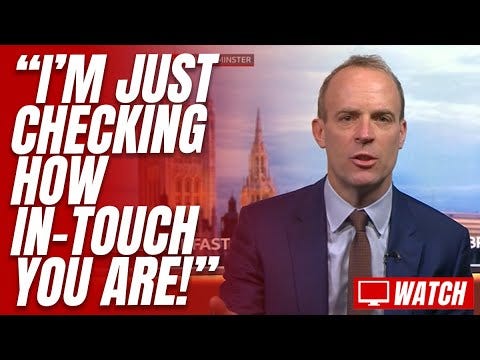I don't care if politicians know the price of a pint of milk
Dominic Raab, Deputy Prime Minister of the UK, got an amusing exchange in when being interviewed by Charlie Stayt on the cost of living. It’s probably not great politics, but I for one was happy to see an interviewer being wrong-footed when trying to pull the tiresome “gotcha” question about the current price of something.
The worst part is when Stayt realizes Raab knows exactly the cost of a liter of petrol and he can’t score an easy point from this line of questioning:
“So it’s gone up … er, it has gone up more since that. I mean, I’m not trying to catch you out on this…”
Yes you are, Charlie Stayt. Catching him out is exactly what you’re trying to do. You planned your list of questions for this segment, and you put one in about the price of petrol hoping that you’d be all over Twitter that evening as the man who uncovered how out of touch Dominic Raab is. Do you expect us to believe that you’re wasting the time of the Deputy PM and your entire audience to make a little small talk?
David Laws tells the story that during his time in government he saw a document labelled Confidential Economic Briefing for the Prime Minister and Deputy Prime Minister. Thinking it could be an unpublished insight on the recovering economy, he instead found a table labelled “Key Statistics”:
Asda Semi-Skimmed Milk - 49p
800 gram Hovis medium wholemeal loaf - £1.35p
Heinz Baked Beans - 68p
Mars Bar - 54p
[…]
This was back in 2015. The tactic hasn’t got any fresher or more innovative since then. Surely now that it’s sufficiently well-known that the civil service are briefing the politicians we can see that this is totally played out and we’re only testing how well they remember their briefing. And before you say that well-briefed politicians sounds like an excellent idea, perhaps you could consider whether they could spend their time on more important briefings if we just agreed to drop this.
I might be too sensitive about this line of attack, because I have very little idea of the price of basic necessities myself. This isn’t because I’m a member of the elite, just an average middle-class person. If I need a pint of milk I’ll buy one, and the cost won’t enter into it.
That doesn’t mean I live a life of unbridled excess. Instead, I categorize my spending into three groups:
I can always afford this, no thought needed, in any quantity I’m likely to need it:
milk
potatoes
petrol
chocolate
train fares
I can probably afford this, but I need to pay attention and not over-spend:
fancy dinners
air travel
clothes
I needn’t bother thinking about this:
prestige cars
business class air travel
polo ponies
I don’t forget that there are a lot of people who aren’t as lucky as me, and the question of how best to create a more equitable society is an interesting one that should occupy our attention. But pretending that I’m poorer than I am will do nothing to help the genuinely poor, and I’m tired of the collective pretense that it does.
Even if I kept a close watch on the cost of individual items, it would do little to give a real picture of what live in poverty is like. Fretting in the supermarket over a sliced loaf before I return to my owner-occupied home where I work a stable and absurdly over-paid 9-5 job in a knowledge industry. Is that really going to improve my empathy for the poor?
People for whom a Mars bar is a cost worth bothering over have far more problems in their life than can be appreciated by just knowing the price of something. They have insecure work with unsociable hours, and sick parents and troubled children and difficult family relationships, face prejudice at work or in education or from the police. Maybe they struggle with long-term illness. Everyone will have a different set of challenges, but to pretend that their problems would be solved by a change in consumer prices alone is patronising.
It would be fair to reply that while the general form of the “don’t know the price of a pint of milk” argument is facile, it’s a lot more appropriate when consumer price inflation is the specific topic under discussion. I’ll grant that, but the “gotcha” approach still represents a cheapening and simplification of what should be a more complex argument.
Not every politician understands poverty equally well, although thanks to their constituency work most understand it much better than people given them credit for. The goal of holding politicians to a high standard for empathy is one that I support. If we’re serious about this, we should be treating this as the complex issue that it is, asking serious questions and critically appraising their answers.
Checking whether someone can recite grocery store prices is a lazy heuristic. We should judge them by what they actually do and say, and whether their reasoning is sound. If we can’t be bothered to do that we should have the decency to admit that we aren’t really all that engaged with politics.


